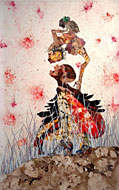15/12/2005
Wangechi Mutu
SFMoMA, San Francisco
New Work

From December 16, 2005, to April 2, 2006, the San Francisco Museum of Modern Art (SFMOMA) will present the exhibition New Work: Wangechi Mutu. Organized by SFMOMA Curatorial Associate Tara McDowell, the exhibition features three collaged works on Mylar, sculptures, and a site-specific wall installation by the artist Wangechi Mutu. Mutu makes luscious yet unsettling pictures of female figures. Her painted and collaged works function as potent social critique while simultaneously exploring more poetic strains of mythology and allegory, as well as the sensuousness of form, color, and pattern.
The urgency of her work speaks to art’s most powerful function: to show us the world through the highly subjective and personal lens of the artist. Particularly interested in myths about gender and ethnicity that have long circulated in Africa and the West, Mutu has adopted the medium of collage—which by its nature evokes rupture and collision—to depict the monstrous, the exotic, and the feminine. In this way she taps into a rich art-historical vein that includes politically motivated works from artists ranging from Hannah Hoch and John Heartfield to Adrian Piper, Martha Rosler, and Kara Walker.
Wangechi Mutu, Misguided Little Unforgivable Hierarchies, 2005; Collection SFMOMA, purchased through a gift of The Buddy Taub Foundation, Jill and Dennis Roach, directors; (c) Wangechi Mutu *Please note: The artist will create new site-specific work for this exhibition; this piece will not be on view. Mutu sorts through mass-produced images of women, cutting them into fragments—eyes, lips, manicured nails, and stiletto-clad feet—that she arranges on the walls and floor of her studio like specimens. Her source material includes magazines on fashion, hunting, cars, and pornography (the latter, the artist reports, has the most realistic brown skin). She begins with sheets of cut Mylar, a nonabsorptive synthetic material on which she manipulates ink and acrylic paint into splotches and colliding pools. These painted forms usually depict the bodies, or body parts, of her figures. After assembling the bodies, Mutu accentuates them with elements from her trove of photographic fragments; they may also be situated in landscapes of long grasses made from thin slices of contact paper or, as in her more recent works, embellished with fur or glitter.
At SFMOMA, Mutu will create a site-specific gallery installation with a large collage of a female figure as its centerpiece. The white walls of the gallery will be gouged and dusted with red pigment, then mottled with white paint to create a suggestion of bruising. The final elements will be three sculptures that Mutu refers to as “thrones," unadorned wooden chairs with elongated legs. Suspended from the ceiling above each chair will be a wine bottle that points downward and dispenses drops of red wine that fall to the floor through a hole in the chair, creating splotches on the ground that resonate visually with both those on the walls and those that often appear in Mutu’s collages. The gallery walls and the sculptures are surrogates for the body: a bleeding body, a wounded and pierced body, an unwell body, a female body.
These sculptures also symbolize a Western power structure that is lofty and oppressive, yet simultaneously weak and structurally unsound. As the artist explained, “There is this tiny percentage of people who live like emperors because elsewhere blood is being shed. Women’s bodies are particularly vulnerable to the whims of changing movements, governments, and social norms. They’re like sensitive charts—they indicate how a society feels about itself."
Born in Nairobi, Kenya, in 1972, Mutu moved to New York in the mid-1990s to study anthropology and fine art at the Cooper Union for the Advancement of Science and Art. She received an MFA in sculpture from Yale University in 2000. Her work has been included in such exhibitions as Only Skin Deep: Changing Visions of the American Self, organized by Coco Fusco and Brian Wallis for the International Center of Photography, New York; Pin-Up: Contemporary Collage and Drawing at the Tate Modern, London; Fight or Flight at the Whitney Museum of American Art at Altria, New York; and Africa Remix, an internationally traveling exhibition that originated at the museum kunst palast, Dusseldorf. Her work resides in the collections of such institutions as the Museum of Contemporary Art, Los Angeles; the Museum of Modern Art, New York; the Museum of Contemporary Art, Chicago; the Altoids Collection at the New Museum of Contemporary Art, New York; and SFMOMA.
The New Work series is generously supported by Collectors Forum, an auxiliary of SFMOMA and the founding patron of the series. Major funding is also provided by Mimi and Peter Haas, Nancy and Steven Oliver, Robin Wright, and the Betlach Family Foundation.



